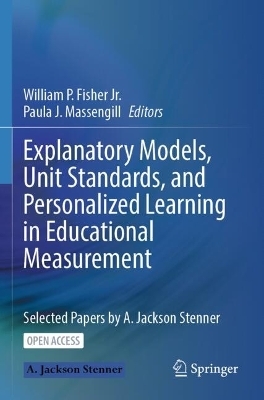
Explanatory Models, Unit Standards, and Personalized Learning in Educational Measurement
Springer Verlag, Singapore
978-981-19-3749-1 (ISBN)
This is an open access book.
William P. Fisher, Jr., Ph.D. received his doctorate at the University of Chicago, where he was mentored by Benjamin D. Wright and supported by a Spencer Foundation Dissertation Research Fellowship. Dr. Fisher is recognized for contributions to measurement theory and practice that span the full range from the philosophical to the applied in fields as diverse as special education, mindfulness practice, clinical chemistry, and survey research. As Professor of Research at LSU School of Medicine in New Orleans, Fisher hosted two International Objective Measurement Workshops, and was recognized by the city of New Orleans for his contributions in public health. Fisher’s recent work focuses on the role uniform units of measurement play in harmonizing creative improvisations at the level of individual decisions and behaviors with the need for comparability, continuity, and navigability at the level of organizations and communities. In efforts toward fostering more informed dialoguebetween the natural and social sciences, Fisher began contributing in 2008 to a symposium hosted by the International Measurement Confederation (IMEKO) on the human and social value of measurement. Involvement of educational, psychological, and health care measurement experts in IMEKO symposia has grown in the years since then. A 2016 IMEKO symposium hosted by Mark Wilson and Fisher at UC Berkeley attracted nearly equal numbers of metrology engineers and psychometricians. A 2018 special session they organized and chaired at the IMEKO World Congress in Belfast was another historic first in bringing together experts in measurement across the sciences. Paula J. Massengill is a graduate of the University of Maryland, College Park with degrees in education and curriculum development. She has been a contributing editor to manuscripts and books by Jack Stenner for over 20 years. She was one of the key editors on the original grants that seeded Dr. Stenner’s seminal work on the Lexile Framework.
1. The Standardized Growth Expectation: Implications for Education Evaluation.- 2. Construct Definition Methodology and Generalizability Theory Applied to Career Education Measurement.- 3. Testing Construct Theories.- 4. Toward a Theory of Construct Definition.- 5. Most Comprehensive Tests Do Measure Reading Comprehension: A Response to McLean and Goldstein.- 6. Measuring Reading Comprehension with the Lexile Framework.- 7. Readability and Reading Ability.- 8. Mapping Variables.- 9. Theory Referenced Measurement: Combining Substantive Theory and the Rasch Model.- 10. Matching Students to Text: The Targeted Reader.
| Erscheinungsdatum | 20.10.2022 |
|---|---|
| Zusatzinfo | 11 Illustrations, color; 30 Illustrations, black and white; LXXIII, 325 p. 41 illus., 11 illus. in color. |
| Verlagsort | Singapore |
| Sprache | englisch |
| Maße | 155 x 235 mm |
| Themenwelt | Geisteswissenschaften ► Psychologie ► Test in der Psychologie |
| Naturwissenschaften | |
| Sozialwissenschaften ► Pädagogik ► Allgemeines / Lexika | |
| Sozialwissenschaften ► Pädagogik ► Bildungstheorie | |
| Technik | |
| ISBN-10 | 981-19-3749-4 / 9811937494 |
| ISBN-13 | 978-981-19-3749-1 / 9789811937491 |
| Zustand | Neuware |
| Informationen gemäß Produktsicherheitsverordnung (GPSR) | |
| Haben Sie eine Frage zum Produkt? |
aus dem Bereich


